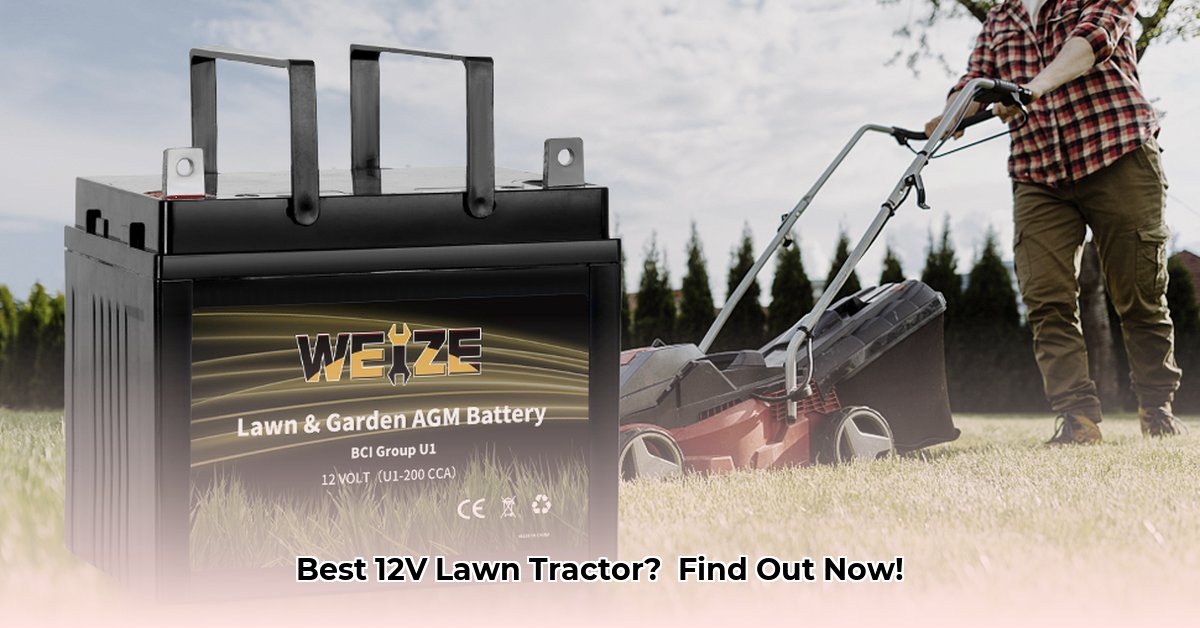
Choosing the right 12-volt battery for your lawn tractor is crucial for reliable performance and a smooth mowing experience. A poorly chosen battery can lead to frustrating breakdowns, especially during crucial mowing seasons. This comprehensive guide will walk you through selecting the ideal battery, ensuring your lawn stays perfectly manicured. For more information on electric lawn tractors, check out this helpful resource.
Understanding 12-Volt Lawn Tractor Batteries
Your lawn tractor's battery powers the starting system and accessories. Two key metrics define its capabilities: Cold Cranking Amps (CCA) and Reserve Capacity (RC). CCA (Cold Cranking Amps) measures the battery's ability to deliver power in cold weather—essential for reliable starts, especially in colder climates. A higher CCA ensures a quick, dependable engine crank, even on frigid mornings. Conversely, Reserve Capacity (RC) indicates how long the battery can power accessories (headlights, etc.) if the engine stalls. Higher RC provides longer backup power.
Two common battery types are lead-acid and Absorbent Glass Mat (AGM). Lead-acid batteries are generally more affordable but offer shorter lifespans and are susceptible to damage from vibrations. AGM batteries, while initially more expensive, boast superior durability, vibration resistance, and longer lifespans. They are better suited for the harsh conditions a lawn tractor endures. This makes them a potentially cost-effective option in the long run.
Key Features to Look For
When selecting a 12-volt lawn tractor battery, several features stand out:
High CCA: A higher CCA rating is crucial, particularly in colder regions, ensuring consistent starts regardless of the temperature. Consider exceeding manufacturer recommendations for added reliability. Don't underestimate the impact of cold weather on starting performance.
Robust Construction: Lawn tractor batteries endure considerable vibrations and impacts. Opt for batteries with durable polypropylene cases, offering superior impact and corrosion resistance for prolonged lifespan and protection against environmental elements.
Maintenance-Free Design: Maintenance-free batteries eliminate the need for regular fluid level checks or topping off, saving you time and effort. This convenience is significant over the long haul.
Correct Group Size: Always check your lawn tractor's manual for the correct group size. Using an incorrectly sized battery can lead to safety hazards and damage to the tractor.
Example: Brands like FVP and DieHard are known for their high-quality construction and reliable performance. Researching these and similar brands will help in finding the ideal battery for your machine.
How to Choose the Right Battery: A Step-by-Step Guide
Choosing the right battery is made easy with these six steps:
- Consult the Manual: Your lawn tractor's manual specifies the recommended group size and minimum CCA rating. This is essential for compatibility and safety.
- Assess Your Climate: Harsh winter conditions demand a higher CCA rating to ensure trouble-free starts.
- Consider Usage: Frequent or extensive use warrants a battery with a higher RC to handle the increased demand.
- Compare Specifications: Compare batteries based on CCA, RC, group size, construction materials, and warranty.
- Read Reviews: User reviews provide valuable insights into real-world performance and longevity. Pay attention to long-term usage reports.
- Check the Warranty: A robust warranty demonstrates the manufacturer's confidence in their product's durability and reliability.
Battery Maintenance and Care
Proper care extends your battery's life and performance:
- Regular Charging: Use a suitable charger to maintain a full charge. Avoid letting the battery completely discharge. Frequent top-ups are better than infrequent deep charging.
- Clean Terminals: Corrosion hinders power flow. Regularly clean terminals with a wire brush and baking soda solution to ensure optimal conductivity.
- Safety Precautions: Always wear safety glasses when handling batteries. Avoid sparks or flames; battery acid is corrosive and dangerous.
- Proper Storage: Store unused batteries in a cool, dry place fully charged to preserve their charge.
Environmental Considerations and Recycling
Dispose of old batteries responsibly. Lead-acid batteries contain hazardous materials.
- Locate a Recycling Center: Many auto parts stores and battery retailers offer recycling programs.
- Check Local Regulations: Your municipality likely has specific disposal requirements. Proper disposal safeguards the environment.
Conclusion
Selecting the right 12-volt lawn tractor battery is critical for reliability and performance. By understanding CCA, RC, battery types, and maintenance, you'll ensure your lawn tractor operates efficiently for years to come. Remember that responsible battery disposal protects the environment.
Resources
[Insert links to reputable retailers, manufacturers, and battery recycling programs here]